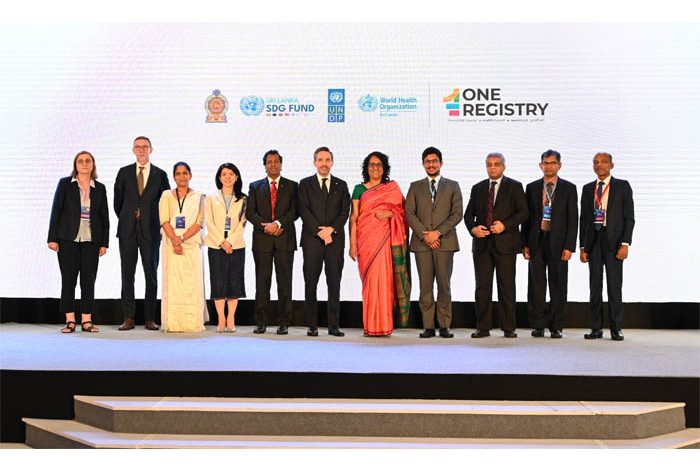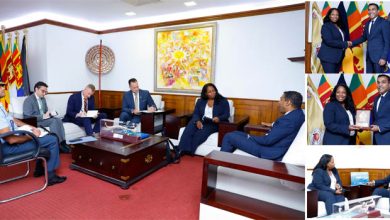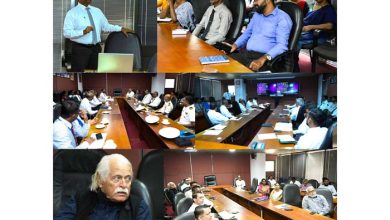
The Government of Sri Lanka and the United Nations in Sri Lanka have launched the ‘Transforming Local Administrative Data Collection Systems for SDG Acceleration’ Joint Programme, marking a significant step towards strengthening the country’s Civil Registration and Vital Statistics (CRVS) system. This initiative, named ‘One Registry’, implemented by the United Nations Development Programme (UNDP) and the World Health Organization (WHO) in Sri Lanka, and supported via the UN Sri Lanka SDG Fund, aligns with the Government’s broader digital transformation agenda and strategy, aiming to ensure equitable access to quality public services for all citizens, particularly vulnerable populations, and paves the way for inclusive digital transformation and sustainable development.
The project launch was held recently in Colombo, with the participation of Hon. Prime Minister (Dr.) Harini Amarasuriya; Hon. Minister of Public Administration, Dr. A. H. M. H. Abayarathna, Minister of Public Administration, Provincial Councils and Local Government; Eranga, Weeraratne, Deputy Minister, Ministry of Digital Economy; W.R.A.N.S. Wijayasinghe, Registrar General; Marc-Andre Franche, Resident Coordinator, United Nations Sri Lanka; Azusa Kubota, Resident Representative, UNDP in Sri Lanka; Dr. Shalala Ahmadova, Officer-in-Charge, WHO Sri Lanka; Dr. Hans Wijayasuriya, Chief Advisor to the President on Digital Economy, alongside UN partners, development agencies, private sector organizations, and CSOs.
Highlighting the programme’s transformative potential, Hon. (Dr.) Harini Amarasuriya, Prime Minister of Sri Lanka, emphasized that “Strengthening the CRVS system is a transformative step towards enhancing public administration and driving our digital agenda. This initiative will ensure every Sri Lankan has access to critical services and a recognized legal identity, fostering transparency, inclusivity, and progress.”
The initiative focuses on three pillars: digitalized civil registration processes, a functional interoperable registry linked with key government agencies and increased public awareness and digital literacy to maximize the system’s benefits. These efforts will complement national digital initiatives, such as the e-NIC and Sri Lanka Unique Digital Identity (SLUDI) projects, advancing the country’s vision of a unified and digitally inclusive society.
Reflecting the UN’s commitment to innovation and sustainability, Mr. Marc-André Franche, Resident Coordinator of the United Nations in Sri Lanka, commented, “The CRVS programme is a critical part of Sri Lanka’s digital journey, providing legal identity for all and generating high-quality data for data-driven policymaking. With the right policies and partnerships, digital technology can drive sustainable development, fostering greater inclusivity and accountability in governance. The United Nations in Sri Lanka is proud to partner with the Government to build a people-centered system that leaves no one behind.
Commenting on the initiative, Lars Bredal, Chargé d’Affaires a.i of the Delegation of the European Union to Sri Lanka and the Maldives noted, “We are happy to partner with the Government of Sri Lanka, UNDP, and WHO through the UN Sri Lanka SDG Fund on the launch of the Joint programme to modernize the country’s civil registration and vital statistics system, facilitating equitable access to quality public services. As a global contributor to the Joint SDG Fund’s digitalization window, the EU Global Gateway funding will directly contribute to progress on interlinked SDGs through investment in digitalization. The EU stands ready to share best practice in digitalization and data protection.”
The ‘One Registry- Everyone Counts! හැමෝම වැදගත්! அனைவரும் முக்கியம்!’ project supports Sri Lanka’s commitment to achieving the SDGs by laying the groundwork for scalable and sustainable reforms, setting a robust foundation for data-driven policymaking and digital inclusion in Sri Lanka.





